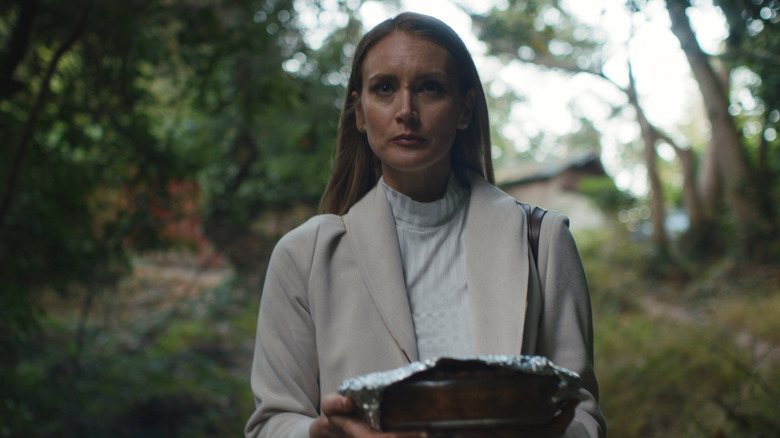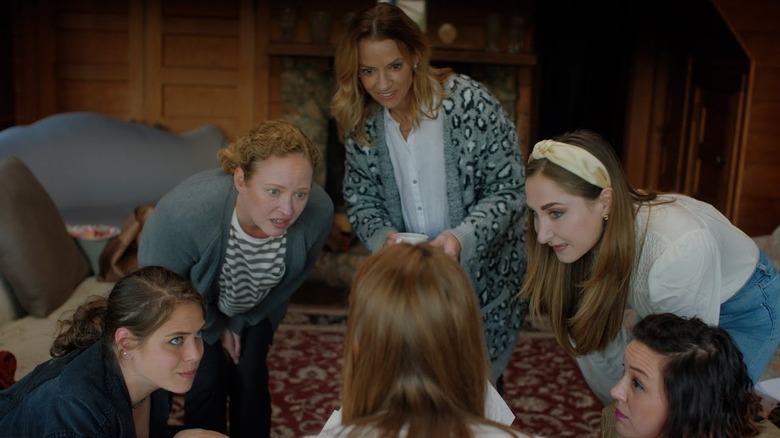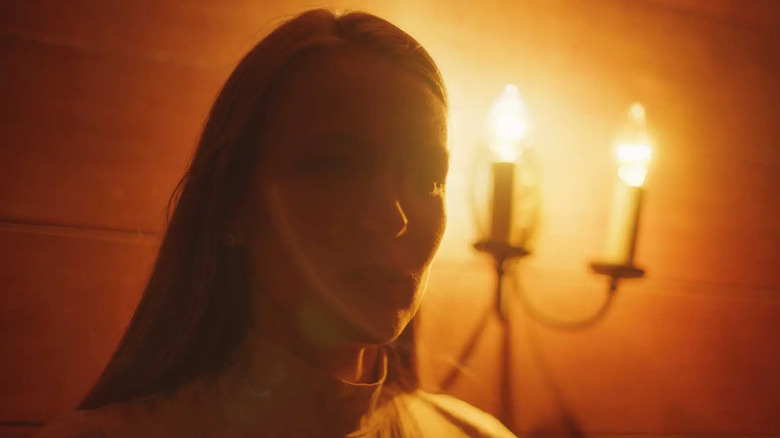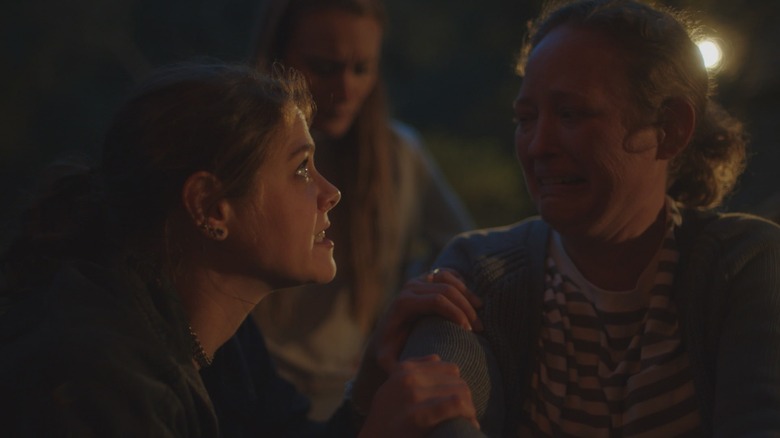Soft & Quiet Brings The All Too Real Horror Of White Supremacy To Netflix
Last year, I was invited for a few beers by a professor I'd interviewed for an article. He's an amiable chap who holds a well-respected position in the scientific community and we chatted away nicely for a few hours. Then, out of the blue, he decided to share his views on race with me. I won't give you the full details, but suffice enough to say that he feels that ethnic minorities are comparable to certain types of vermin.
I was gobsmacked. I'm a pretty woke guy and I don't think I give off any white supremacist vibes, so I couldn't understand why he thought these vile ideas were suitable for casual conversation with a new acquaintance. I had to take a few minutes outside to consider my next move. I usually try to avoid arguments but I knew I couldn't just let it go, so I went back inside and calmly dismantled his argument. We left on good terms, but I haven't received any further invites from him.
The incident taught me something that I guess I already knew but hadn't had first-hand experience with, at least, not to my knowledge — that people harboring extreme right-wing views aren't just knuckle draggers with swastikas tattooed on their foreheads. They can also be urbane, well-educated, and charming individuals with good jobs and standing in the community, who can go for hours without raging about wokeness, immigration, or Replacement Theory (a particular favorite among xenophobes here in the Czech Republic).
Writer-director Beth de Araujo makes this point with chilling clarity in her disturbing debut feature "Soft & Quiet." It is marketed as a horror under the Blumhouse label, but the most terrifying thing is its all-too-real message that virulent racism is often hidden behind friendly smiles.
What happens in Soft & Quiet?
"Soft & Quiet" introduces us to kindergarten teacher Emily (Stefanie Estes), who has arranged a mixer at the local church for women in the community who share similar views to her. As we discover when she unveils the cherry pie she has baked, that means white supremacists gathering for the first meeting of "Daughters for Aryan Unity." The group is intended as a safe space for them to air their grudges and discuss how to spread the word in the battle against multiculturalism, and we get a glimpse at socioeconomic factors that sometimes exacerbate hateful thoughts.
Retail worker Marjorie (Eleanore Pienta) struggles from paycheck to paycheck and is disgruntled because a Colombian colleague has been promoted over her; while Kim (Dana Millican), the most outspokenly racist of the bunch, owns a store that is in financial trouble and rants about a Jewish conspiracy. Like many regular people with right-leaning views who feel threatened or marginalized by people of color, they blame cultural diversity and political correctness for their troubles. Into this mix also comes ex-con Leslie (Olivia Luccardi), a newcomer who doesn't seem particularly racist but enjoys being part of something.
Filmed to look like one long take, "Soft & Quiet" follows the women from sharing racist rhetoric over cake and wine to committing a disgusting hate crime. The inciting moment comes when the group stops at Kim's store for supplies and ends up intimidating two Asian-American sisters, Anne (Melissa Paulo) and Lily (Cissy Li), who enter the shop without realizing it is closed. Things escalate into a violent confrontation before Emily's husband Craig (John Beavers) arrives and defuses the situation.
The infuriated group decides to get payback by breaking into Anne's house to steal her passport. The cruel act quickly goes south, turning into a far more deadly situation when the sisters unexpectedly come home early.
Viewer reaction to Soft & Quiet
"Soft & Quiet" made its debut on U.S. Netflix last month and audience reaction has been so strong that it has warranted coverage in the U.K. The Mirror reported on the shocked responses shared on social media, which have varied from stunned praise to outright disgust. In the former camp, one viewer said:
"An incredibly daring film in both form and content, writer/director Beth de Araújo conceived of this real-world horror story as a real-time oner and knocks it out of the park."
On the other hand, the material proved too tough for some:
"It's literally the only movie I have rented and then refused to finish. It's also the only movie I want to send to hell in the express lane."
As with "The Strays," the British psychological horror that dropped on Netflix earlier this year, viewers reacting badly to "Soft & Quiet" seem more disturbed by the way it handles timely issues than the film as an actual horror movie. I also checked out some user reviews on Google, and it's noticeable that many people leaving a one-star rating cite the exact reason why it is such a powerful piece of work for their low score. Namely, it is an unflinchingly disturbing film populated by detestable characters who carry out vile and ugly acts. Naturally, it has also proven polarizing in our divided society, with some presumably right-leaning viewers dismissing it as a propaganda piece from "intolerant leftists" that only serves to perpetuate racism. Go figure.
One thing is for certain: getting picked up by Blumhouse and screening on Netflix has helped "Soft & Quiet" reach a larger audience. That can only be a good thing as the conversation around Beth de Araujo's startling debut will continue to grow.
Is Soft & Quiet worth watching?
"Soft & Quiet" is a powerful work that marks Beth de Araujo as a writer and director to watch out for. Actually sitting through the film requires some fortitude, however, because it is a grueling experience. My stomach lurched the moment Emily revealed the decoration on her cherry pie and stayed lurched all the way through to the chilling conclusion.
De Araujo's objective is to show how right-wing extremism always has the potential to grow from casual grumbling about ethnic minorities to appalling violence, which she achieves with the help of her unnervingly convincing ensemble. There are moments in the sickening final scenes when the actors look uncomfortably caught up in the moment, which is probably emphasized by the one-take format. In an interview with Forbes, the director explained why her film needed to be so hard-hitting:
"I would hope this film encourages people to take that leap to start confronting hateful thinking in their own minds and in the minds of those around them. It is easy to not have difficult conversations, but hopefully, this film sparks some. Thoughts and words have weight. Hateful thoughts and words have more weight. Violent rhetoric can quickly escalate into real-world violence."
The decision to film it as a one-shot is bold for a debut feature, one that has the usual advantages and pitfalls of the technique. At its best, it makes you feel like a passive participant and accomplice with a horribly claustrophobic effect. For the most part, cinematographer Greta Zozula keeps the camera movement inconspicuous, but there are a few moments when it draws attention to itself and breaks the illusions.
Overall, "Soft & Quiet" probably shook me the most since I survived "Come and See." It's not a fun experience, but then hate crime isn't fun either. That's what makes it such a necessary film.



